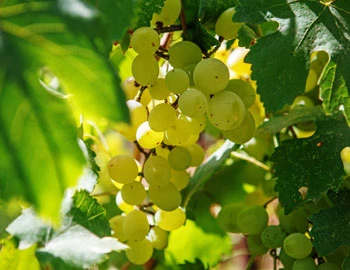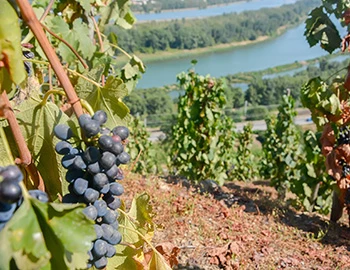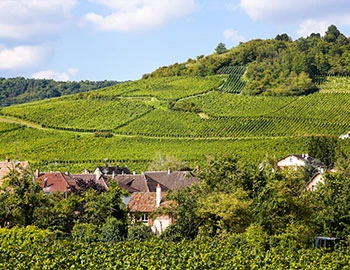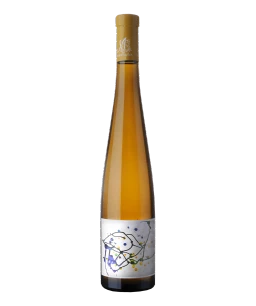
Muscat de Beaumes de Venise 2018
AC, Domaine de Beaumalric, 750 ml

| Grape variety: | Muscat |
| Producer: | Domaine de Beaumalric |
| Origin: | France / Rhône / Muscat de Beaumes-de-Venise |
Description
Pale golden yellow with golden tinge. Highly fragrant bouquet of fresh grapes and Granny Smith apples. On palate this fortified wine shows a pleasantly crisp and fruity palate. Slightly honeyed, yet remains fresh in the finish.
Attributes
| Origin: | France / Rhône / Muscat de Beaumes-de-Venise |
| Grape variety: | Muscat |
| Ripening potential: | 2 to 3 years after harvest |
| Drinking temperature: | 10 to 12 °C |
| Food Pairing: | Fruit tart, Smoked fish, Foie gras |
| Vinification: | fully destemmed, fermentation at low temperatures |
| Harvest: | hand-picking, in several rounds (tries) |
| Maturation: | in steel tank |
| Volume: | 15.0 % |
| Note: | Contains sulphites |
Muscat
A sweet family
Over 200 varieties have “Muscat” in their names, and many are completely unrelated. What they share is a fragrance of fresh grapes. Muscat owes its name to the intense aroma. It derives from the word “musk”, and appears in documents dating from 1230. The most common representative of the Muscat line is the white Muscat blanc à petits grains. In Italy, it is known as Moscato Bianco, and in Germany and Styria as Gelber Muskateller. In Switzerland it is called Muscat du Valais. Researchers largely agree that it originated in Greece, and from there found its way via Italy to southern France. When crafted with expert hands, it turns out fresh, floral and spicy with a slightly tart note. Pressing it into high quality wines is not very easy. Sweet forms have greater renown, such as Muscat de Rivesaltes and Muscat de Beaumes-de-Venise from southern France or Muscat from the Greek island of Samos.

Rhône
Rhône: northern power, southern charm
The Rhône’s source is in Valais, and it flows into the Mediterranean 800 kilometres to the south. In the last 200 kilometres of its course, it is lined with vines which yield a range of red crus that are among the most prestigious wines in the world – for example, on the spectacular cliffs of the Hermitage Mountains, or in the gravelly terraces of Châteauneuf-du-Pape. The river valley, however, is also a rich source of characterful white wines and affordable, high-quality, everyday red wines.

France
France – Philosophy in a bottle
According to French philosophy, wine should be an expression of the soil and climate. They use the word “terroir” to describe this. Terroir makes every wine different, and many especially good. French wine is regarded worldwide as an expression of cultural perfection. The French believe that humans are responsible for the quality of the berries, the vine variety for their character, and nature for the quantity. This philosophy can be expressed succinctly as: “the truth is the vineyard, not the man.”






